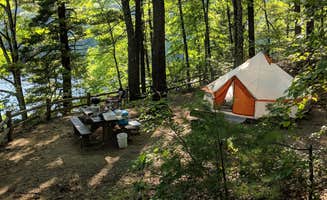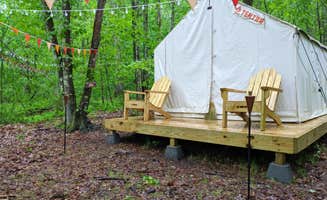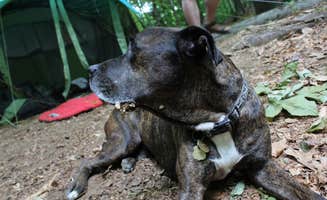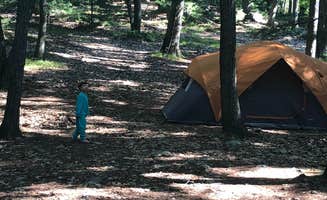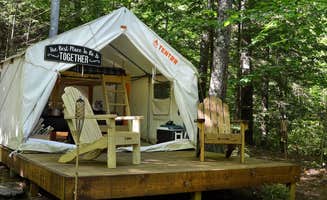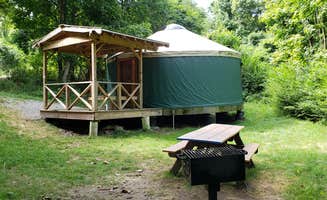Tent camping near Princeton, Massachusetts presents secluded opportunities within the forested landscapes of Worcester County. At elevations ranging from 600-1000 feet, the area's rolling terrain creates diverse microclimates for campers. Summer night temperatures typically drop 10-15 degrees cooler than daytime highs, making sleeping conditions comfortable with proper gear.
What to do
Paddling excursions: Tully Lake Recreation Area offers rental equipment for water adventures. "We take our canoe and spend the whole day at the lake. You can find lots of private areas to swim, pick blueberries and relax," notes camper Ben P. The lake features several islands to explore by kayak or canoe.
Hiking trails: The region contains numerous marked paths with varying difficulty levels. At Barton Cove Campground, campers can explore shoreline trails with views of the Connecticut River. One visitor shares, "In mid-August we collected handfuls of blackberries as we explored Peddocks."
Fort exploration: Several campgrounds contain historical military structures open for self-guided tours. "We found all kinds of bunkers and a brick house," reports one camper at Boston Harbor Islands. These structures date back to various periods from the Revolutionary War through World War II.
What campers like
Privacy between sites: Federated Womens Club State Forest offers secluded camping with substantial natural barriers. "Some of the sites are definitely walk-in, with a narrow trail leading from the road," notes Jean C. Sites typically have 50-100 feet of forest between neighbors.
Water views: Many campers appreciate shoreline camping options. "There are 6 yurts up a small hill, with a composting toilet and water from a tap nearby. The 6 tent sites are also in this area," explains one visitor about Boston Harbor Islands State Park.
Night sky viewing: The rural nature of camping areas near Princeton provides excellent stargazing opportunities. "Sitting on the beach watching the sun set over Boston was awesome and made everything entirely worth it," shares Jess G. Light pollution is minimal compared to urban areas, especially at higher elevation sites.
What you should know
Accessibility challenges: Many campgrounds require carrying gear from parking areas. "If you have a folding wagon, you may appreciate having it to carry items on and off the ferry and to your site on the island," advises one camper about Camp Nihan Education Center.
Water availability: Not all campgrounds provide drinking water. "Bring your own water. There is a composting toilet located near the group site in the field," explains a reviewer about Federated Womens Club State Forest. Plan to carry 1-2 gallons per person per day.
Reservation timelines: The best tent camping near Princeton, Massachusetts requires advance planning. "These sites book quickly, so you should try to book 7 months to the day in advance. That said, you can also look for last minute openings," notes Martha H. about Boston Harbor Islands.
Tips for camping with families
Choose sites with amenities: Families benefit from campgrounds with basic facilities. "The group site is super close to parking and yet the terrain is rugged enough that it always felt like we were really in the woods. A recently renovated bathroom and shower facility makes clean ups easy," shares Michael V. about Camp Nihan.
Consider noise factors: Some campgrounds experience periodic loud campers. "We went memorial day weekend few years ago, busy holiday of young teens partying. Park staff tried their best, but other campers definitely took away from our stay," cautions Lauren A. about Tully Lake Recreation Area.
Select water-accessible sites: Children enjoy swimming opportunities at Buck Hill Campground. "There's a small somewhat sandy area that perhaps used to be a beach of sorts, though no lifeguards or anything. The water is clean and fine for swimming with a few areas that make for easy entry into the water," notes Greg R.
Tips from RVers
Limited hookup options: RV camping near Princeton has few full-service options. "The office was super helpful when I called to make reservations, making sure to ask questions about how big my tent was, what kind of view/privacy we wanted etc so they could help me find the perfect campsite," explains Brie B. about Barton Cove.
Alternate parking arrangements: Many tent-focused campgrounds require RVers to park separately from their sites. "You check in at the office, grab a key to unlock the gate, drive to the campground, unlock gate, drive through gate, lock gate, unload your stuff, drive to gate, unlock gate, drive through gate, lock gate, return key, drive back to campground, walk to your site," describes a Barton Cove visitor.
Limited turning radius: Access roads to campgrounds are often narrow with tight turns. One visitor to Boston Harbor Islands mentions, "I would recommend however if I had the chance I would bring my own boat," highlighting the challenge of accessing some of the best tent camping near Princeton with larger vehicles.


